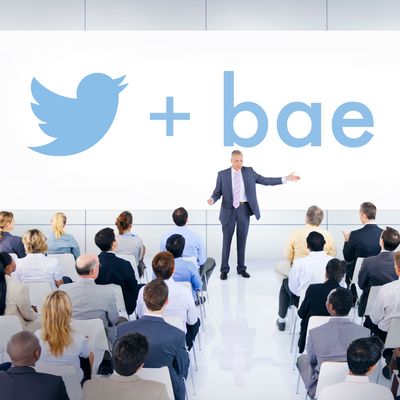
This was a year of many terrible things — aviation disasters, the establishment of a hyperviolent caliphate, and Gamergate, just to name a few. Add to that list the galumphing attempts of consumer brands to curry favor with #millennials on their #social networks with #memes designed to go #viral.
A new, horrible-brilliant Twitter account distills the trend down to its essence. It is called @BrandsSayingBae. It is comprised of brands tweeting the word bae or other trending neologisms. And it is, as the Verge puts it, just what “we’ve needed in 2014.”
Perhaps you missed this gem from earlier in the year:
Or this one:
Or perhaps this one:
You can almost hear the white-collar conversation leading to tweets like these if you listen closely enough: “Jones, the youths have adopted new phraseology again! This time it’s bae. Pronounced like the Chesapeake, spelled like babe with one letter missing!”
Sometimes, the results of such corporate-think are really funny. I, for one, am a huge fan of Denny’s stoner-Dada Twitter account:
But more often, brands’ attempts at manipulating social media or referencing memes, current events, or trends come off as desperate (#thirsty, as a brand would put it) or offensive. There was Best Buy making a joke about a murder victim. There were all the companies tweeting the 9/11 anniversary. There was this weird thing about LeBron James and wiping your butt:
Too often, in other words, brands on Twitter are not on-trend. Brands on Twitter are your uncle posting out-of-focus selfies on Instagram with 13 hashtags, including #Sunday and #shorts. Brands on Twitter are your high-school science teacher comparing electrons to Zack Morris to try to get you to stay awake in fifth period. Brands on Twitter are your weird cousin talking during the movie when you’re just trying to watch, okay? Jesus, Freddie, do you always need to be the center of attention?
So why do companies keep doing it? And why are they so, so bad at it? Well, they did see lightning get captured in a bottle once, on the evening of February 3, 2013. The San Francisco 49ers and the Baltimore Ravens had just kicked off the second half of their Super Bowl matchup when a power outage hit the stadium. Fans went crazy on Twitter — had Beyoncé rocked the halftime show so hard that she blew a fuse? And a few canny companies capitalized on the mania, including Oreo:
It was perfect — funny, sweet, timely, on-brand, apropos. It went viral, with a suit at Oreo’s parent company declaring that the tweet “not only shows the power of real-time engagement, but also the sheer importance of understanding the overall media ecosystem.”
But it demonstrates the fundamental problem of corporate tweeting just as well as all those bad tweets do. It was perfect. It was also pointless. Oreo produced that tweet because it could, not because it needed to. People retweeted it. They wrote about it. They talked about it. But I doubt that they purchased or consumed more cookies because of it. And I doubt that they thought more positively of the Oreo brand, either. That’s true of almost all corporate tweets, coupons and promotions aside. They rarely get much traction, good or bad.
So why post them at all? I’ve put that question to my digital-media, social-media, and marketing friends many times over the past year. The answer generally is a shrug. People who buy things are on social media. Posting on social media is free or cheap. Brands want to seem relevant, and want to meet customers where they are, and want to do what their competitors are doing and more. But on social media, it’s hard to get people’s attention, so you need to go out on a limb. You need to interrupt them, or provoke them, or use their lingo, gratuitously. That’s how you end up with Taco Bell Vine videos and Sour Patch Kids Snapchats and consumer-goods companies interrupting Game of Thrones and brands tweeting bae.
There is no grand theory, great strategy, or smart branding there. But you probably already knew that, from checking out those tweets.





























